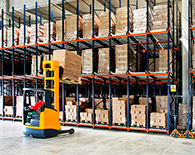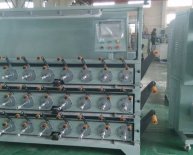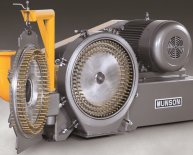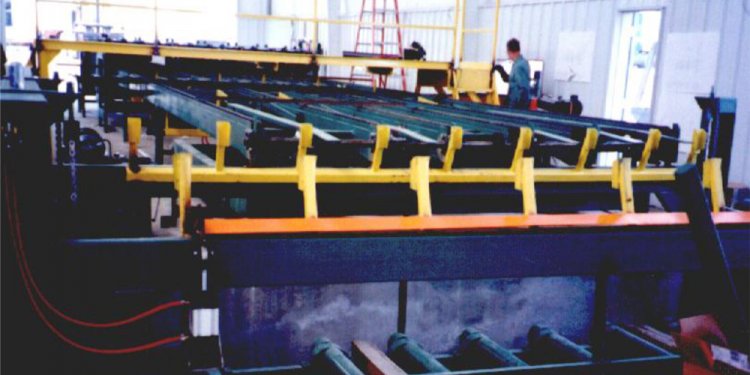
Wood Handling Equipment
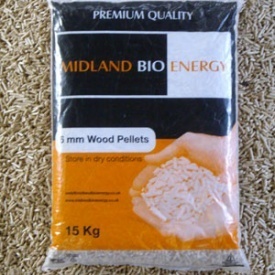 Midland Bio Energy Ltd., a wood pellet company in Warwickshire, England, has invested £20, 000 ($27, 319) in new handling and screening equipment to improve the quality of the pellets they deliver and efficiency of the operating systems. All the equipment was refurbished and installed by biomass specialist engineers from Milson Engineering, and will enable the company to handle up to 40 metric tons per hour.
Midland Bio Energy Ltd., a wood pellet company in Warwickshire, England, has invested £20, 000 ($27, 319) in new handling and screening equipment to improve the quality of the pellets they deliver and efficiency of the operating systems. All the equipment was refurbished and installed by biomass specialist engineers from Milson Engineering, and will enable the company to handle up to 40 metric tons per hour.
A new telescopic elevator is amongst the new investments installed and commissioned on May 22. “The telescopic elevator allows us to adjust the length and direction of the elevator to get the most effective fill of the receptacle being loaded, ” said Andy Brindley, managing director of Midland Bio Energy.
The investment is also allowing the company to better estimate the full capacity of the yard. Brindley reports that up to 1, 000 metric tons of wood pellets could be stored. “The surplus space will be used for yet more handling equipment and allow us to stock more related products, ” Brindley said.
A new screen takes another portion of the investment. “Before installing the screen no effective cleaning was being performed prior to loading bulk loads, ” Brindley said. “The only screening being done was prior to bagging.”
The screening equipment includes a 5-metric-ton-hopper feeding a belt and bucket 5 meter elevator, which in turn feeds the pellets to the rotary screen “at the correct rate to allow optimum cleaning, ” he added. The pellets are fed from the center and cleaned as they are pushed out over the rotating screen by centrifugal force. The screen has 8 millimeter diameter holes and the pellets are 6 millimeters in diameter. “This does not mean that the pellets fall through the holes while passing over, but anything smaller falls through the holes and becomes separated from the pellets and fed into a separate container, ” Brindley said. The smaller fragments separated from the pellets are called screenings, which is mainly dust.
One of Midland’s specialties is delivering wood pellets in bulk. This new screen “will improve the quality of the pellets being delivered through our bulk pneumatic delivery system, ” Brindley said. The bulk vehicles will be loaded with pellets straight from the screen, then fed directly to the customer’s fuel storage. The system works by attaching a hose to the pellet truck, air is then fed through a chamber feeding the pellets to the pipe. The air pressure in the pipe is between 0.5 and 1 bar (7.25 to 14.5 psi), depending on the length required to deliver the pellets. The pellets travel down the pipework into the customer’s fuel storage. Brindley adds that to prevent the buildup of explosive pressure the store has to be fixed with an exhaust.
Brindley believes the company’s investment will boost revenue and customer satisfaction. “By demonstrating to our customers that we can deliver the required quality pellets we would expect a revenue increase between 10 to 20 percent above our normal increase, ” Brindley said. “We should also see a higher retention rate of existing customers through consistently providing high levels of service.”
Beyond the quality of the pellets delivered, Midland plans on improving their bagging system with a new bagging line. Brindley said the new line “should improve speed and handling of our bagging process.”
Brindley founded Midland Bio Energy in 2007 when energy companies were increasing their prices, and he was looking for an alternative energy source. The U.K. government offered financial incentives to businesses and house holders that started to use renewable energy. This proposed considerable growth in the sector “made the idea of starting a wood pellets business even more exciting, ” Brindley said.
In more recent years the U.K. government is continuing their involvement in furthering renewable heat usage to achieve the reduction in CO2 emissions.
According to Midland Bio Energy’s website, the renewable energy directive stipulates that 15 percent of the Nation’s electricity should be produced from renewable sources by 2020. In addition, £860 million of support over the spending review period to back the renewable heat measures through the Renewable Heat Incentive (RHI) has been earmarked.
“The current market for biomass is reasonably buoyant with the government funded RHI attracting people to invest in biomass heating installations, with the RHI guaranteeing payments for 20 years, ” Brindley said. “The uptake of renewables is still relatively low with awareness being the greatest issue.”

